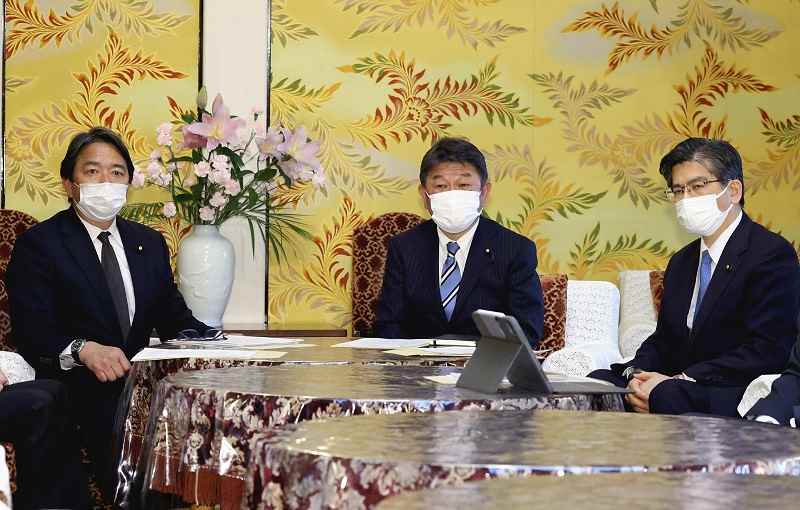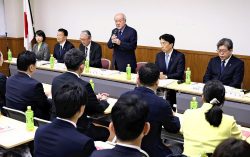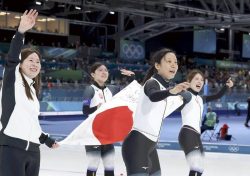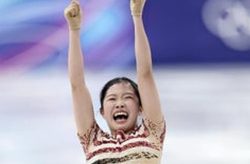
From left: DFPF Secretary General Kazuya Shinba, LDP Secretary General Toshimitsu Motegi and Komeito Secretary General Keiichi Ishii pose for a photo at the Diet Building in Tokyo on Tuesday.
7:00 JST, April 21, 2022
The Liberal Democratic Party, Komeito and the Democratic Party for the People have agreed to expand the scope of their three-party policy discussions, adding to the talks the issue of young carers — minors forced to take care of family members on a daily basis.
Adding this issue is expected to deepen policy coordination among the three parties, according to political observers.
LDP Secretary General Toshimitsu Motegi and his counterparts, Keiichi Ishii of Komeito and Kazuya Shinba of the DPFP, agreed to set up a three-party task force to discuss the issue when the three secretaries general met on Tuesday at the Diet Building. The LDP is considering tapping former Health, Labor and Welfare Minister Norihisa Tamura for the task force.
The three parties launched policy discussions in March, and the DPFP asked the LDP and Komeito to add the issue of young carers. The two coalition parties responded they would consider it positively.
During the Tuesday talks, the three parties also agreed to not impose, for the time being, the “trigger clause” to temporarily cut gasoline taxes, and to keep discussing the matter.
The secretaries general agreed to continue to implement from May a program to hold down gasoline prices by providing oil wholesalers with a maximum subsidy of ¥25 per liter of gasoline, and to ask the government to widen the types of oil products covered by the program.
LDP wants DPFP to stay in talks
By agreeing to add the issue of young carers to the three-party policy talks, the LDP hopes to keep the DPFP close to the coalition side through continued negotiations. The three parties believe maintaining the policy discussion framework will aid them in the upcoming House of Councillors election this summer.
During the Tuesday meeting, the secretaries general quickly reached a consensus on the trigger clause. The meeting lasted only for five minutes.
The DPFP voted for the fiscal 2022 budget on the condition that the trigger clause would be imposed at an early stage. DPFP leader Yuichiro Tamaki has tried to spur on the coalition side through maneuvers such as hinting at its withdrawal from the three-party discussion framework. Agreeing to continue to discuss the trigger clause helps the DPFP save face to a certain extent.
“This is not the end of the game,” Shinba said after the talks on Tuesday.
Earlier in the day, a working-level discussion team of the three parties agreed to continue discussions on the trigger clause. The document compiled by the team lists problems with the current subsidy program, leaving room for the clause’s implementation, which reflects consideration for the DPFP.
In the upper house election, the LDP is prioritizing constituencies where one seat is up for grabs, as the outcome in these constituencies will determine the fate of the election.
There are 32 constituencies where one seat is being contested. The opposition camp unified their candidates in the 2016 and 2019 elections, with the LDP losing in 11 constituencies in 2016 and losing in 10 in 2019.
The LDP’s recent moves to accommodate the DPFP are aimed at achieving closer ties between the opposition party and the ruling camp, in the hope that the DPFP will aggressively field candidates in the constituencies where one seat is being contested. It hopes this will prevent the opposition camp from fielding joint candidates as much as possible, and minimize the LDP’s defeats.
For the DPFP, staying in the three-party discussion framework will help the party increase its popularity ahead of the upper house election.
“Even in a small way, we want to help even just one person by getting things done with policies or political matters,” Tamaki said.
Komeito also believes the three-party framework will work better for it. With its senior coalition partner showing consideration for the DPFP, Komeito believes that keeping step with the DPFP in pressing policy matters on the government and the LDP is a quick way to realize the policies it seeks to achieve.
“We have many things in common with the DPFP regarding policies that prioritize people’s livelihoods,” a senior Komeito member said, indicating that the party may seek closer cooperation with DPFP.
Top Articles in Politics
-

Japan PM Takaichi’s Cabinet Resigns en Masse
-

LDP Wins Historic Landslide Victory
-

LDP Wins Landslide Victory, Secures Single-party Majority; Ruling Coalition with JIP Poised to Secure Over 300 seats (UPDATE 1)
-

CRA Leadership Election Will Center on Party Rebuilding; Lower House Defeat Leaves Divisions among Former CDPJ, Komeito Members
-

Japan Tourism Agency Calls for Strengthening Measures Against Overtourism
JN ACCESS RANKING
-

Japan Institute to Use Domestic Commercial Optical Lattice Clock to Set Japan Standard Time
-

Israeli Ambassador to Japan Speaks about Japan’s Role in the Reconstruction of Gaza
-

Man Infected with Measles May Have Come in Contact with Many People in Tokyo, Went to Store, Restaurant Around When Symptoms Emerged
-

Japan PM Takaichi’s Cabinet Resigns en Masse
-

Prudential Life Insurance Plans to Fully Compensate for Damages Caused by Fraudulent Actions Without Waiting for Third-Party Committee Review






















